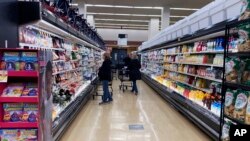The U.N. Food and Agriculture Organization warns global hunger is likely to increase because of soaring food prices, due largely to uncertainties created by the war in Ukraine.
The Food and Agriculture Organization’s latest Food Outlook report forecasts international food prices will hit record highs this year, lifting global import payments to more than $1.8 trillion.
The FAO says economically vulnerable people in the least developed countries, in sub-Saharan Africa, and net importing developing countries will suffer most from food insecurity due to rising costs.
The director of the FAO’s Markets and Trade Division, Boubaker BenBelhassen, says the tightening of markets is expected to persist for all commodities this year. He attributes that to steep price hikes, the frequency and intensity of extreme weather events, market uncertainties due to the war in Ukraine, and sudden trade policy changes.
“This year’s food security crisis is about access. Next year, because of the expected or the lack of availability and the higher costs of imports, in particular for fertilizer and fuel, the concern could be about lack of availability—in other words, lack of food.”
The FAO reports enough food is available to feed the hungry this year, but it is not getting to the people who need it.
BenBelhassen says both Ukraine and Russia are major producers of commodities such as wheat, maize, and sunflower oil. But the war in Ukraine, he notes, is preventing those commodities from being exported to countries in greatest need.
“From our estimation, we see that depending on how much this leads in terms of deficit or gap or reduction in export availability for those with commodities from both Ukraine and Russia, it could lead in anywhere between 11 to 19 million more hungry people. But that is chronic hunger for 2022-2023.”
The World Food Program warns of an impending catastrophe and mass starvation if Russia does not end its blockade of Ukraine’s Black Sea ports.
The United Nations currently is trying to find a so-called package deal to allow Ukrainian-produced food to be safely and securely exported through the Black Sea. The deal also would allow for unimpeded access to global markets for Russian food and fertilizers.
Global Hunger to Rise on Record Food Prices
- By Lisa Schlein

Geneva —






